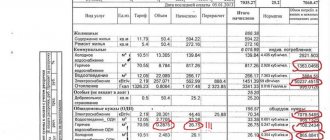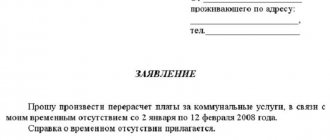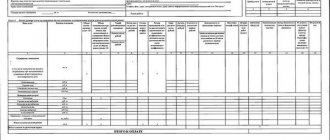What are utility bills
Utility payments are funds transferred by individuals and legal entities to the accounts of service organizations. All owners are required to pay the fee in full and on time.
Utility bills include:
- Water supply (hot and cold).
- Heating.
- Electricity supply.
- Gas.
- Maintenance and safety of shared property.
These are the main services that almost everyone has, but the list is not exhaustive. The basis for the occurrence of an obligation is the conclusion of an individual or collective agreement between the owners of the Moscow Railway.
Housing services
A house cannot do without services that are classified as housing, just as it cannot do without utilities. Their list is standard and may be slightly supplemented by local authorities in different regions.
- Residential and non-residential premises in the house must be illuminated, and there is also a requirement for supplying the required air temperature.
- When performing such services, measures are taken to maintain sanitary standards in common areas and in the local area.
- Housing services include the removal of solid and liquid waste.
- Ensuring fire safety is of great importance.
- Provides a range of housing services: excavation work near the house and landscaping. This also includes major repairs of common property, repairs and maintenance of elevators, and repairs of garbage chutes.
- Every year, preparations are made for the seasonal operation of a residential building. Regular inspection is also necessary.
What regulatory and legal acts regulate housing legal relations?
Legal relations arising between users and providers of utility services are regulated by:
- Housing Code of the Russian Federation;
- The procedure for calculating payments is fixed in Articles 156-157 of the Housing Code of the Russian Federation. They indicate calculation methods, restrictions on the total amount and methods of transferring funds;
- the calculation procedure and conditions for the recalculation procedure are also specified in Government Decree No. 354 part 8 of 2011;
- a fixed tariff for resources is indicated in acts of local executive bodies.
When resolving disputes arising from incorrect calculation of fees for services provided, the following laws apply:
- Civil Code of the Russian Federation, Article 395.
- Civil Procedure Code of the Russian Federation, Article 131-132.
- Law of the Russian Federation “On the Protection of Consumer Rights”.
- Code of Administrative Offenses and Criminal Code.
Thus, for making gross errors when determining the total cost of services, the person who charges utility bills may be held administratively liable. The user has the right to file a complaint against the perpetrators with the Housing Inspectorate, the Prosecutor's Office, the court, Rospotrebnadzor, etc.
Payment order
Payment of utility bills is due by the 10th of each month for the previous month. To pay rent you must:
- By the 25th of each month, provide the house management with individual meter readings.
- When receiving receipts, check that the charges are correct.
- Pay receipts at a cash settlement center or credit institution.
You can pay bills for housing and communal services without using receipts through the electronic GIS system for housing and communal services (Clause 17, Article 155 of the Housing Code of the Russian Federation). To do this, you need to register on the State Services website, go to your personal account of the GIS Housing and Communal Services and select supplier organizations - their names and current accounts can be found in the management organization or in the received receipt.
The order of calculations
All property owners and tenants should know the procedure for calculating utility bills. The monthly fee depends on the presence or absence of a measuring device. If you have a counter, you can accurately determine the amount of resource consumed. To calculate the exact amount, the owner just needs to take the readings correctly.
The amount of the monthly maintenance fee for an apartment without metering devices is affected by the number of persons registered in it. To determine the final value, the tariff is multiplied by the meter readings. Maintenance of common property is added to the resulting amount. If there are no fasteners in an apartment building, the amount of the fee depends on the value of the resource consumption standard, the area of the living space and the tariff.
What is a service for managing apartment buildings?
In accordance with clause 2 of Article 162 of the Housing Code of the Russian Federation, the management company, under an agreement for the management of apartment buildings, on the instructions of the owners of premises in this building, for a certain fee, undertakes to perform work and provide services for the management of an apartment building .
This does not mean one service, but a whole range of works and services, the implementation of which is the responsibility of the management company under the house management agreement. Clause 4 of the MKD Management Rules lists a list of works and services for managing the house.
Read more about apartment management services and associated costs here.
What to do if violations are identified
When receiving receipts, owners are advised to check them completely. Since the management company and housing and communal services often make mistakes in calculations. If violations are detected, the citizen must contact the management of the Criminal Code in writing and point out the error.
After reviewing the appeal, the management company must provide a revised invoice. If no one responded to the appeal or the applicant’s demands were unreasonably refused, then the victim can contact the following government agencies:
- Rospotrebnadzor. This body also deals with resolving such disputes. However, Rospotrebnadzor can only forward the requirements of the Criminal Code and warn the guilty person about the possible consequences.
- Housing inspection. Contacting the Housing Authority in this situation is the most effective. Since addressing issues and disputes related to incorrect calculation of rent is one of their tasks.
- The prosecutor's office. The prosecutor's office has the right to bring the culprit to administrative responsibility for deliberately committing errors and failure to comply with standards when calculating utility bills.
- Court. You need to contact this institution only when other authorities have failed to influence the offender, and he constantly provides receipts with incorrect calculations. Since cases in court are considered for quite a long time (about 2 months), the participation of the applicant will be necessary. But when going to court, the person who suffered the damage will be able to recover moral and material damage.
Before contacting government agencies, it is advisable for a person to contact the employees of the service company and report any deficiencies found. If no measures are taken, you should, without wasting time, file complaints with government agencies. Since the user may be punished for delaying the payment.
When to recognize expenses under a service agreement
The criteria for recognizing expenses are established by Article 252 of the Tax Code of the Russian Federation: they must be documented, economically justified, and aimed at generating income.
Let us remind you that documented expenses mean expenses confirmed by documents drawn up in accordance with the legislation of Russia, or documents drawn up in accordance with business customs applied in the foreign state in whose territory the corresponding expenses were made, and (or) documents indirectly confirming the expenses incurred (including a customs declaration, a business trip order, travel documents, a report on the work performed in accordance with the contract) (clause 1 of Article 252 of the Tax Code of the Russian Federation).
Accordingly, as soon as the customer has all the documents confirming the provision of services, he will be able to take into account the costs of purchasing these services in his income tax expenses.
In a letter dated July 27, 2015 No. 03-03-05/42971, the Ministry of Finance explained when the customer company can take into account the costs of purchasing ongoing services (sent for information and use in work by letter of the Federal Tax Service of Russia dated August 21, 2015 No. GD-4-3/ [email protected] ). A situation was considered in which the primary document was drawn up after the end of the month in which the services were provided, within a reasonable period, but before the submission of the declaration.
Officials indicated that accounting legislation allows the formation of a document confirming expenses incurred after the reporting date, but immediately after the end of the provision of services for the month.
If the primary accounting document confirming the provision of ongoing services for the past month was drawn up immediately after the end of the month in which the fact of economic life was committed, within a reasonable period, but before the date of submission of the declaration (before the 28th day), then such primary documents should be taken into account in the reporting period to which they relate. In this case, the primary document must indicate to which period it relates. For example, “Act of acceptance and transfer of services for November 2015.”
Tax expert M.S. Savranskaya , for the magazine “Regulatory Acts for Accountants”
Develop professionally
Invaluable experience in solving current problems, answers to complex questions, specially selected latest information in the professional press for accountants. Subscribe quickly >>
What changes have been made to the law?
In July 2021, new rules for reflecting utility payments in documents were introduced. The changes mainly affected the structure of the receipt. It included fees for the maintenance of common property and the amount of fines in a separate column. The location of the personal account number and the document number have also been changed. And the column for major repairs was removed. Thanks to these, calculations were made.
All citizens who use the service provided are required to transfer money for utilities. In this connection, the question of how they are calculated interests many. However, there is nothing complicated in calculating the cost of service; you just need to know the tariff established in the region and be able to take readings correctly. If the final result differs from the figure indicated on the check, the payer must immediately find out the reason for this discrepancy.
How to calculate and pay
Upon receipt of receipts, residents can recalculate the correctness of charges for the following resources:
- cold and hot water supply;
- heating;
- electricity;
- gas supply.
Expenses for general house needs are calculated and accrued by the accounting staff of the Management Company.
When receiving receipts, it is important to check that mandatory services (cleaning entrances, repairing elevators, etc.) are not listed in a separate expense column, since they are already included in the basic “house maintenance” column. The cost of cold water is calculated using the formula: P = O*T , where T is the cost of a cube of cold water established in the region, and O is the number of cubic meters of water consumed, equal to the change in personal meter readings per month.
The payment for hot water is calculated using the formula: P = O*T + K*T2 , where O and T are the meter readings and the tariff for cold water, respectively, K is the amount of energy spent on heating the consumed water, and T2 is the tariff for thermal energy . That is, the payment for hot water includes the cost of the volume of liters consumed at the cold water tariff and the cost of thermal energy spent on heating the water.
In the absence of individual metering devices, the amount of payment for cold and hot water supply is calculated as P = O*T*H1/H2*K , where:
- O – the volume of consumed resources, calculated using a collective metering device;
- N1 – number of persons living in the apartment;
- H2 – the total number of persons living in a house with a collective meter installed;
- K – increasing factor equal to 1.5.
The K coefficient is intended to encourage residents to install individual meters.
Heating costs are calculated using the formula: P = O*T*P(kW)*P(total) , where O is the volume of consumed thermal energy in Gcal, taken from the readings of a common house heat meter, T is the tariff for thermal energy, and P (sq) and P(total) – the area of the payer’s apartment and all residential premises of the house, respectively. In the absence of a common house meter, instead of the volume of energy consumed, the consumption standard adopted in the region is taken into account.
Electricity charges are calculated as the product of the meter readings and the current tariff. If the meter readings have changed by 400 kWh per month (average consumption for a family of two), and the cost of a kilowatt is 1.5 rubles, then the electricity fee will be 600 rubles per month.






